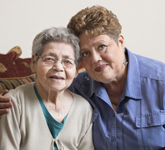AARP Hearing Center
By Kathleen Connell

We didn’t see this coming. Not many of us, anyway.
People who have recently reached retirement age mostly dreamed of days of leisure and travel along with and the joys to – if so blessed – spend time with grandchildren and great grandchildren. Downsizing would turn out to be the best decision ever and life in a retirement community would lead to new friendships and deck chairs at the pool.
I’m not going to say this does not describe some folks. Good for them. What I am talking about are people well into their 60s and older who find themselves spending much of the early chapters of the “golden years” of retirement caring for and sometimes even sharing living space with their parents.
A recent story in Kaiser Health News that also ran in USA Today caught my eye, and it included new research you may find fascinating.
Many Americans, Sharon Jayson writes, are among a growing group of seniors living with a parent or parents. And that, you can be sure, means these 21st-century post-retirement years might well include parental caretaking. I probably don’t need to tell you that longer life expectancy has altered the landscape.
“Caregiving for an older family member is not what it was when first studied and coined as the ‘sandwich generation,’ those people squeezed between aging parents and young children,” said Amy Horowitz, a professor of social work at Fordham University in New York City who is quoted in the story. “Now it’s the children who are on the verge of retirement or who have retired and are still having responsibility of older parents,” she added.
At the University of Massachusetts-Boston, gerontologist Kathrin Boerner’s research reveals a recurring theme when it comes people in their 90s and older, and their “children” who, by some definitions at least, we would call elderly.
Many of “the kids” are direct caregivers. Otherwise, most monitor their parents’ welfare and, to some degree, their lifestyles are dictated by their parents’ needs.
Boenrner calls this “aging together.”
If you came of age in the rock ‘n roll ‘50s and I think it is safe to say you could never have imagined this outcome.
Oh, no. You spent years awaiting a time of life when the nest would be empty and, freed from the nine to five work grind, you would enter a couple of decades of great freedom. You saved for it; you felt you’d earned the good times.
“But for those with very old parents,” Boenrner says, “it just doesn’t happen.”
She told a gathering of the Gerontological Society of America that, “The very old are the fastest-growing segment of the population in most developed countries, with an expected increase of 51% of elders age 80+ between 2010 and 2030.” Two-thirds of the very old, she said, have advanced-aged children, who typically serve as their primary caregiver.
“We heard things from someone like an 80-year-old — ‘I don’t have a life.’ Imagine that. You’re 80 years old, and ‘I don’t have a life because I’m caring for my mother,’” Boerner added.
If this doesn’t make your head spin, consider what happens when the health of that “elderly child” begins to fail just when hers or his parents need them most?
There’s no silver lining to this story. It is just the way it is.
What is clear is this: You need a plan. When there are siblings, conversations need to start early. Decisions about housing options and retirement relocation need to be carefully considered. Talk with friends facing a similar situation. This does not have to be an either/or endeavor.
Most important, if you are retired and taking care of parents, you need to be sure to take care of yourself as well.































































